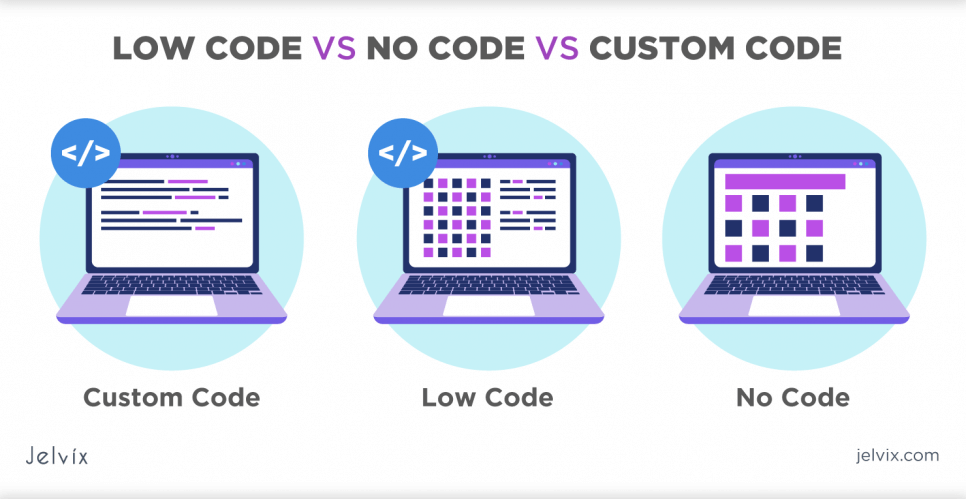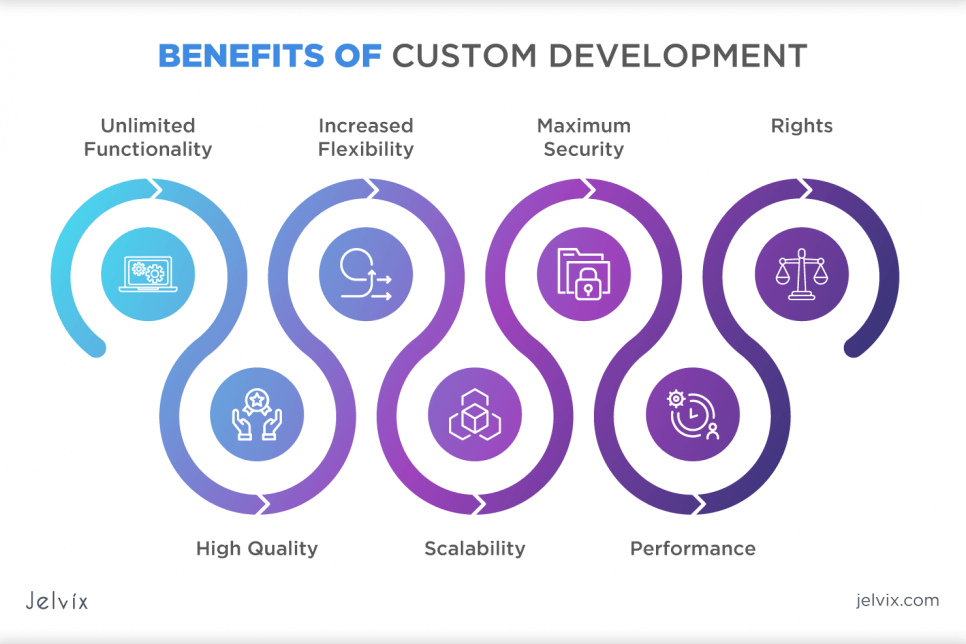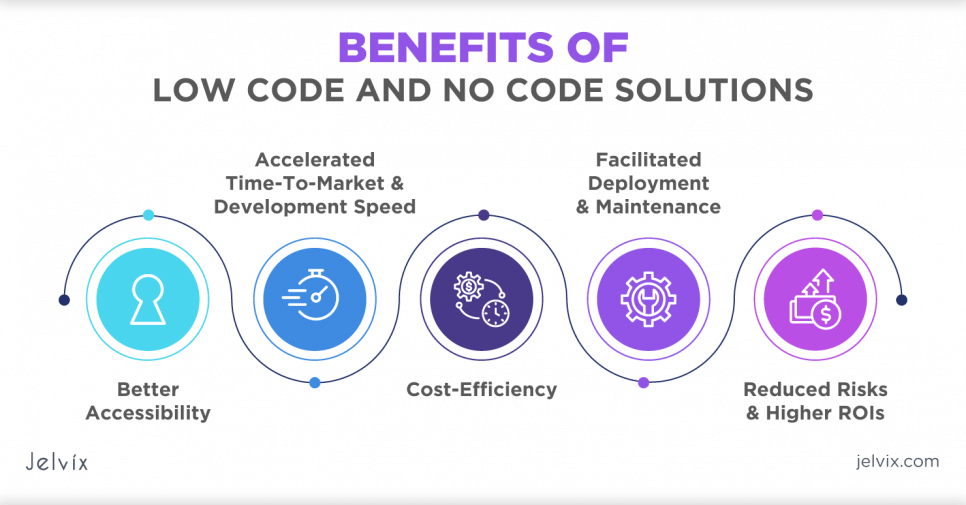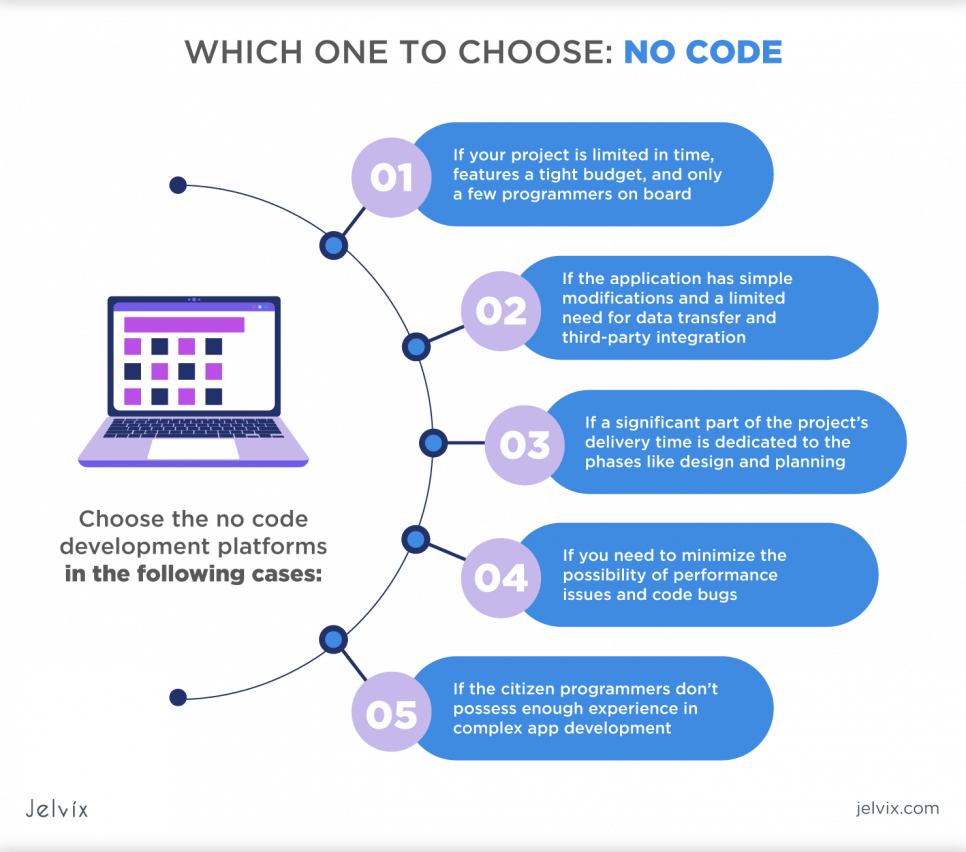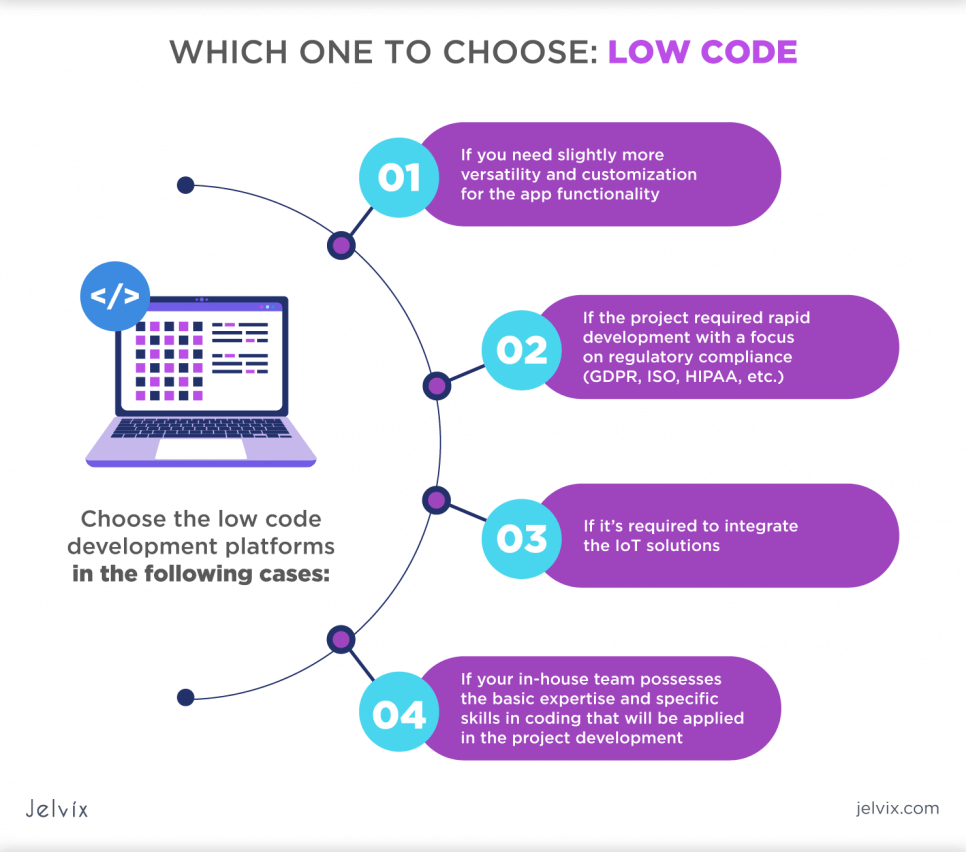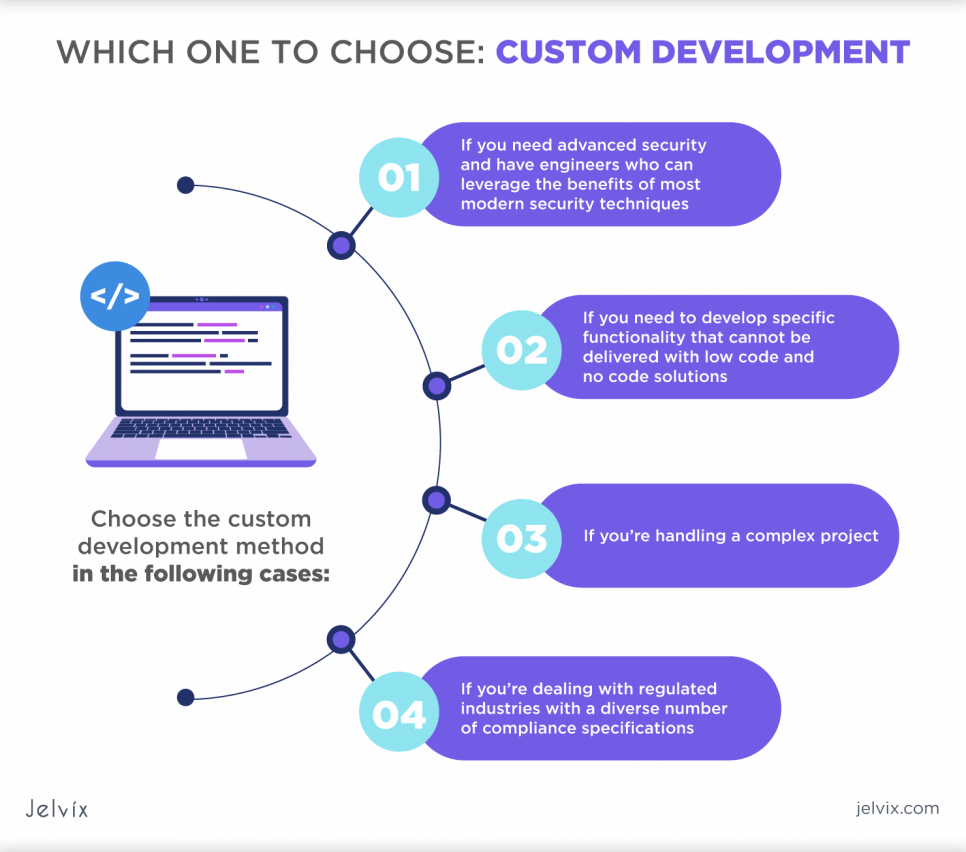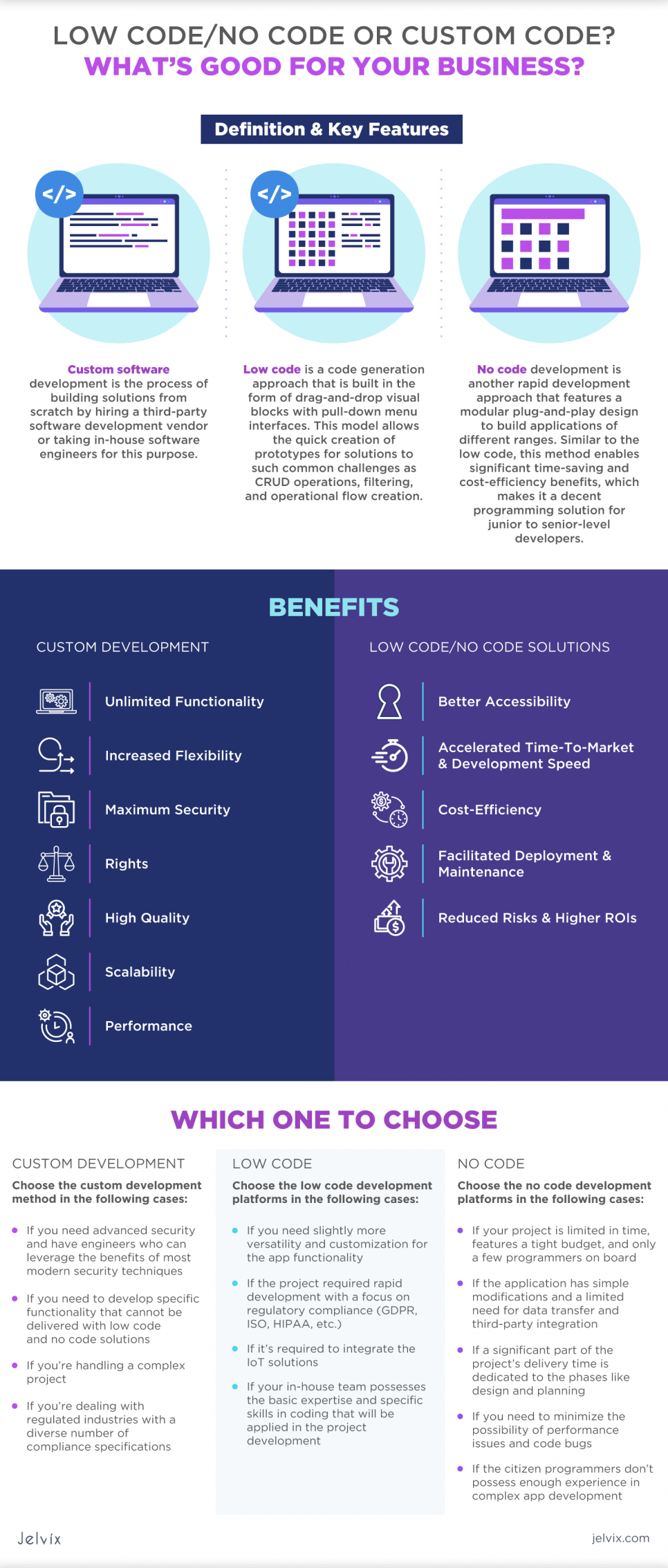The increasing demand for IT innovations has uncovered a serious problem of talent shortage in the solutions development segment. With more and more IT projects getting relegated to the “pending” file, the time-to-market delivery of thousands of different solutions increases, which, in turn, affects business performance and market development overall.
To address this issue, developers from different IT segments are continually implementing a wide range of software development solutions, methodologies, and approaches. Agile development, rapid prototyping, SMART goals, and lean approach are only a few approaches being used for accelerating the development process.
In this article, we’ll compare low code, no code, and custom development methodologies. To be able to understand the value of each, we’ll go deeper into their key differences, benefits, and possible drawbacks of low code/no code/custom code application development.
Thus, by the end of this article, business owners will find out the most efficient model for their projects and will be able to make an informative decision on which development approach can deliver the highest profits for their enterprises.
Custom Software Development: Definition & Key Features
Custom software development is the process of building solutions from scratch by hiring a third-party software development vendor or taking in-house software engineers for this purpose. Companies usually turn to custom development when they need to fulfill the needs of end-users with specific features that cannot be found in already-existing solutions.
A custom development process involves requirements collection, development plan creation, MVP modeling and analysis, UI/UX design, final custom code writing, testing, and maintenance. Only with such an approach to software development companies can ensure the maximum fulfillment of their business needs.
Benefits of Custom Development over No Code and Low Code Solutions
From the advantages outlined above, it becomes more than obvious that a custom approach has a large potential to facilitate the development process, optimize the coding and enhance delivery time.
The most critical reasons why companies choose custom software development are as follows:
Unlimited Functionality
Traditional custom development has full freedom in software programming, as its design doesn’t set any limits for the app development process. So, if you need to launch a feature-specific product for your business, it will probably be better to write custom code to bring all your ideas to life.
Increased Flexibility
As custom development gives you full access to the source code, you can benefit from maximum flexibility. So you can easily adjust the existing functionality or introduce new features to the solution in order to keep up with the ever-changing needs of your business. Such flexibility is a huge advantage in the long run, as it will allow you to stay competitive in the market.
Maximum Security
Custom development solutions give you full control over the source code, meaning you can implement all the modern protection techniques you want. In the case of low code and no code solutions, the security would mainly depend on the service provider. Thus, if you need an application that will be processing lots of sensitive business- and customer-related information, it’s better to opt out for a custom approach. However, make sure that you work with professional developers who know how to leverage all the benefits of custom development.
Rights
With custom development, only you have access to the source code, so your solution belongs solely to you, and you can use it for any commercial purposes. In the case of no code and low code development, downloading the source code is impossible limiting the solution’s use cases.
High Quality
Custom software usually tends to be of better quality because it’s built by engineers with years of experience who utilize modern technologies to perfectly meet your unique business needs. In the other case, with no code and low code development, you just try to apply the existing solution to solve your problem, however, due to a lack of customization such a solution will not be perfectly what you need.
Scalability
As your business grows you may need to increase the performance, boost the security and enhance the functionality of your software. Having created the solution from scratch, you can easily scale it up so it can successfully handle and process bigger masses of data.
Performance
While developing custom software from scratch, you’ll be able to adjust its performance specifications. In the case of low code and no code solutions, the performance would solely rely on the default specifications of the low code platform provider, and it cannot be improved. Thus, if you need a highly-performing application that would be able to handle a massive amount of data and with large scaling potential, you’d need to opt for custom development from top-notch engineers.
Knowing all the benefits of the custom approach, let’s learn more about the low code/no code approach to software development.
Low Code and No Code: Definition & Key Features
Though both approaches relate to the software development scope and have some common characteristics, they aren’t the same thing. Let’s review the specifics of app development under no code and low code methods through the lens of their meaning and understand their difference from the well-known custom development.
What is Low Code Application Development?
Low code is a code generation approach that is built in the form of drag-and-drop visual blocks with pull-down menu interfaces. This model allows the quick creation of prototypes for solutions to such common challenges as CRUD operations, filtering, and operational flow creation.
Low code development is a middle link between traditional development, which is popular among advanced coders, and no code application development, which is targeted at citizen developers and IT newcomers. Unlike other models, it is more versatile and features higher customization options without affecting the delivery speed or budget. Therefore, it can significantly facilitate the development of complex and feature-rich software solutions.
Some of the most notable examples of low code development include web and mobile app development, cross-platform solutions, robotic automation technologies, appraisal management software, and many more.
What is a No Code Development?
No code development is another rapid development approach that features a modular plug-and-play design to build applications of different ranges. Similar to the low code, this method enables significant time-saving and cost-efficiency benefits, which makes it a decent programming solution for junior to senior-level developers.
At the same time, no code app development has more limited customization opportunities, which, compared to a low code alternative, is compensated by its user-friendly and accessible coding qualities.
Examples of applications that are commonly developed with the no code method include self-service solutions for business, dashboards, mobile applications, web platforms, and many more.
Benefits of Low Code, No Code Solutions Over Custom Software
Knowing the basics of what is low code, no code and their market potential, let’s discover the advantages of a programming model. Below are some of the most notable pros of no code vs low code that are commonly considered in app development.
Better Accessibility
Low code and no code solutions are designed that way to be used with little or no technical background. Being one of the most notable advantages, this feature minimizes the complexity of the app development while ensuring its scalability.
That is why it is often applied for software solutions with fewer specifications and features, which are also tight on a budget: MVPs or other software with basic functionality.
Accelerated Time-To-Market & Development Speed
Regardless of the target industry, app development speed has always been the key point to consider in any software project. Business owners always aim to develop an app within the shortest time possible to stay ahead of their competitors. The proven way to achieve this goal in software development is to launch a cross-platform minimum viable product (MVP).
Unlike traditional app development, low code and no code protocols support cross-platform programming, which enables the creation of a functional, sustainable cross-platform MVP solution within the most reasonable time. According to 451 Research, businesses can reduce the app development time by 90% using these coding methodologies.
Cost-Efficiency
With a low code/no code approach, businesses can also save up the project costs on app development. This is mostly caused by the following no code and low code features:
- applying the rapid application development (RAD) concept, which reduces the delivery time;
- hiring citizen developers instead of high-paid senior specialists, which cuts down the labor costs;
- utilizing fewer ready-made programming platforms and tools, which optimizes cost allocation.
Thus, enterprises can quickly bring their ideas to life without sacrificing the product’s quality or delivery time.
Facilitated Deployment & Maintenance
Compared to old-school software programming, low code app development helps teams efficiently address potential problems, code bugs, and related performance issues during the deployment stage.
Thus, businesses can always roll back changes to the previous version with a single click and eliminate the potential issues before they become a headache.
Reduced Risks & Higher ROIs
Low code and no code solutions have become a top choice in supporting industry standards and security best practices, mainly explained by their development simplicity and sustainability.
Enterprises can now focus on their business objectives and workflow optimization without compromising the application’s security or its smooth operation.
Low Code/No Code vs Custom Development
Having explored the potential of low code and no code development, the most common question we’re usually asked is whether these solutions can displace the traditional development model out of the race.
After years of experience working with coding, at Jelvix, we’re more than sure that low code/no code approaches are not likely to compete with custom development for various reasons. Let’s compare two approaches in the following categories:
- Flexibility. With manual coding, developers can build nearly any feature that completely fits the client’s expectations and needs. Additionally, creators are not limited in choosing the tech stack, hostings, frameworks, APIs, and other tools, which also results in a higher-quality outcome.
- Customization. When delivering the software with a traditional model, it’s possible to consider and customize all the aspects of your application with no restrictions due to the development specifics. This is the opposite of low and no code development, where it’s required to implement the features based on the limitations of the coding process under each model.
- Expertise. Custom software development will be also a better fit for projects that require deeper expertise in UI/UX design, advanced security, or complex functionality, which is a must for launching a unique, groundbreaking application.
- Control. Unlike low code and no code, custom coding leaves more opportunities for managing the process across all the stages of system development. Therefore, clients can present the product as a proprietary tool with a unique and sustainable system.
- Revolutionary product development. Suppose the key goal of the product is to deliver an innovative software solution with specific functionality that is not currently present in the software market. In that case, custom software development will be a winning option. It can greatly benefit in launching outstanding features which are built according to the slightest details of your tech requirements.
As you can see, not all the projects will fit the low code and no code development – some of those require advanced coding specifics, deeper expertise, or larger versatility, which is completely covered by the traditional custom coding approach.
Thus, Jelvix experts believe that although no code/low code approach may work for small solutions, only custom development can enable the creation of a high-performing and secure solution with extensive functionality.
Let's find out how to choose mobile app technology stack.
Which One to Choose: Low Code vs No Code vs Custom Development?
According to the detailed review of each programming approach, we can clearly see the advantages of the traditional development model. However, when it comes to choosing the most efficient one between low code vs no code and custom development options, business owners are typically uncertain about the answer.
To make the right decision, let’s now summarize the best use cases for each solution in particular.
Choose the no code development platforms in the following cases:
- If your project is limited in time, features a tight budget, and has only a few programmers on board;
- If the application has simple modifications and a limited need for data transfer and third-party integration;
- If a significant part of the project’s delivery time is dedicated to the phases like design and planning;
- If you need to minimize the possibility of performance issues and code bugs;
- If the citizen programmers don’t possess enough experience in complex app development.
Instead, utilizing a low code development platform will be a better option:
- If you need slightly more versatility and customization for the app functionality
- If the project requires rapid development with a focus on regulatory compliance (GDPR, ISO, HIPAA, etc.)
- If it’s required to integrate the IoT solutions
- If your in-house team possesses basic expertise and specific skills in coding that will be applied in the project development
The situation with custom software development is different: it is more versatile and applicable to nearly any project, regardless of its complexity and coding specifics.
We recommend applying the custom development method in the following cases:
- If you need advanced security and have engineers who can leverage the benefits of most modern security techniques;
- If you need to develop specific functionality that cannot be delivered with low code and no code solutions;
- If you’re handling a complex project;
- If you’re dealing with regulated industries with a diverse number of compliance specifications.
Therefore, both low code and no code platforms are highly appreciated for their simplicity, speed, and agility. However, while the no code and low code are mainly targeted at applications with straightforward functionality, traditional coding provides way more flexibility in the app programming process.
Realizing this, business owners can now be able to define the right option for their software development, which is sure to bring the highest value to their business.
Leverage Jelvix Customer Development Expertise to Create Innovative Solutions
Low code and no code development platforms have brought a revolution in the world of software development, making it more accessible, speedy, and productive for businesses across different industries. However, due to the limited functionality and more primitive development specifics, they cannot fully display custom software development in the long run.
As you can see, only custom development can allow you to build complex, industry-specific projects with the advanced functionality and unique user experience planned. However, for your endeavor to be successful, you need to hire a reputable software development vendor. Already searching for the right custom development team for your upcoming project? We’ll get you covered!
Jelvix engineers feature vast expertise in app programming and are continually tracking the latest innovations and trends in custom software development to deliver the most efficient products across multiple industries. So far, our company has enabled hundreds of companies to excel in creating and embedding custom IT solutions of different complexity and industry focus.
If you are considering a custom software project and need expert assistance in its development, contact us immediately! Our experts are always ready to create the most efficient, long-term IT solution that will benefit your business for years.
Need a qualified team of developers?
Use our talent pool to fill the expertise gap in your software development.


